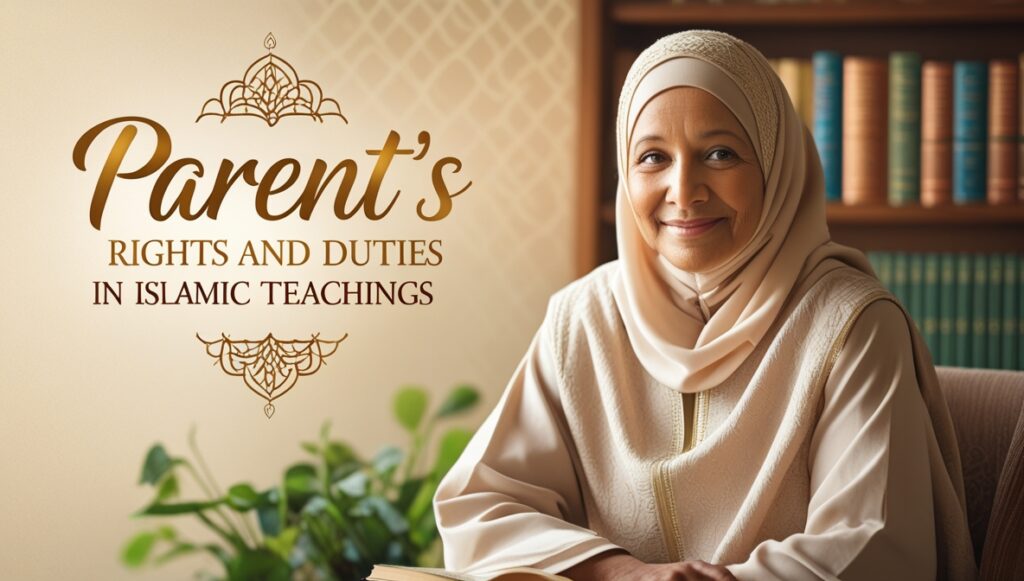Parents hold a very special place in Islam. The bond between a child and their parents is not only about family ties but also about faith. In Islamic Teachings, parents are considered a blessing from Allah, and caring for them is an act of worship. Their guidance, sacrifices, and love form the foundation of a child’s life. The Qur’an and Hadith emphasize respecting parents right after the command to worship Allah alone, showing how important this relationship is.
Rights of Parents in Islamic Teachings
Parents are given many rights that every child must honor. These rights are not only social but also spiritual. Some of the most important ones include:
Respect and Obedience
Children must speak kindly to their parents, listen to them, and avoid harsh words. Obedience is required as long as it does not go against the laws of Allah. Respecting parents is seen as a path to blessings in life.
Care and Support in Old Age
When parents grow old, children have the duty to provide comfort and care. In Islamic Teachings, ignoring parents during their weak years is considered a grave sin. Instead, children are encouraged to show patience and kindness even if their parents become difficult due to age.
Prayers for Parents
Islam encourages children to make dua (prayers) for their parents. The Qur’an teaches believers to pray: “My Lord, have mercy upon them as they brought me up when I was small.” This shows that love for parents continues even after their passing.
Financial Responsibility
If parents are in need, it is the duty of children to support them financially. Providing shelter, food, and other needs is a way of showing gratitude for all the sacrifices parents made.
Duties of Parents in Islamic Teachings
Just as children owe duties to parents, parents also have duties toward their children. These duties are meant to create balance, love, and fairness in family life.
Nurturing with Love
Parents must raise their children with affection and mercy. The Prophet Muhammad ﷺ showed great love for children, teaching parents to build bonds of warmth and care. In Islamic Teachings, harshness and neglect are discouraged.
Providing Education and Faith
Parents are responsible for teaching children about Islam, good manners, and life skills. A child learns their first lessons of faith from their parents. By guiding them toward prayer, honesty, and respect, parents help secure their children’s future both in this life and the next.
Ensuring Basic Needs
It is the duty of parents to provide food, clothing, and shelter. Meeting these needs is part of raising children with dignity. A safe and supportive environment allows children to grow in the right direction.
Being Role Models
Children learn by watching. Parents must practice what they teach. If they encourage prayer, they should pray themselves. If they speak about honesty, they should be truthful. Islamic Teachings highlight that being a good role model leaves a lasting impact on children’s hearts.
The Balance of Rights and Duties
Islam creates balance in family relationships. Parents have rights over their children, but they also carry duties toward them. This balance avoids injustice and builds trust within the family. Children who respect parents and parents who guide with wisdom together create a household filled with mercy and love.
The Spiritual Reward
Caring for parents and fulfilling one’s duties as a parent are both acts of worship. Allah promises great reward for those who treat their parents well and raise their children with care. On the other hand, neglecting these duties can lead to serious consequences. In Islamic Teachings, family responsibility is a path to closeness with Allah and a source of peace in society.
Lessons for Modern Families
In today’s busy world, many people forget these values. Some children leave their parents alone, while some parents neglect their children’s upbringing. Returning to Islamic Teachings reminds us that both sides must give time, respect, and care to each other. Strong families lead to stronger communities.
Finally!
The rights and duties of parents in Islam are based on love, respect, and fairness. Parents deserve honor, care, and prayers, while they must also provide love, guidance, and good upbringing. Following Islamic Teachings helps families build strong bonds that last beyond this life. To learn more about family values and Islamic guidance, connect with NAIF Center and enrich your knowledge.

